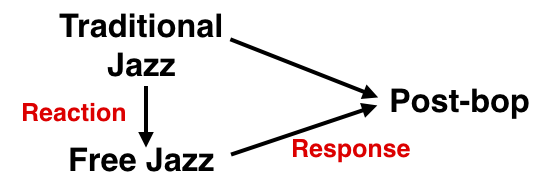Post-bop
By the mid-1960’s the rise of Free Jazz had shaken the very foundations of Jazz. So Mainstream Jazz had to somehow find a way to respond to the avant-garde – and this response was a genre called Post-bop. This subgenre mixes elements of Bebop, Hard-bop, Modal and Free Jazz without necessarily being any one of these style.
Post-bop was more or less invented by Miles Davis’ Second Great Quintet, so a lot of what I’m going to say here relates directly to this group.
If Free Jazz was a reaction to Traditional ‘Tonal’ Jazz, then Post-bop was how Traditional Jazz responded to Free Jazz. The (generalised) features of each are outlined below.

| Feature | Tonal Jazz | Free Jazz | Post-bop |
|---|---|---|---|
| Harmony | - Diatonic chords - Functional chord progressions - Diatonic Key | - No chords - No chord progressions - Atonality | - Non-traditional harmonies - Non-diatonic, non-functional chord progressions - Non-diatonic keys |
| Meter/ Rhythm | - 4/4 time - Swing Rhythm | - Ameter - Rubato - Polyrhythms | - Irregular and Mixed meters - Polyrhythms - Swing & straight rhythm |
| Form | - Standard Form - Head-Solo-Head -12 or 32 bar Head - Standard Turnarounds | - No fixed form - No bar lines - No obvious structure - Pure solo (especially collective improvisation) | - Irregular song form - Circular progressions - Suppressing the Melody & Chord - Songs without melodies or without chords - Time, no changes - Altering the Chord Progression during Solo |
Ambiguity and Controlled Freedom
The way that Post-bop responded to this attack by Free Jazz was with ambiguity – writing songs that were:
- Harmonically ambiguous
- Metrically and Rhythmically ambiguous
- Formally ambiguous
So, in effect, it sits half way between Free Jazz and Tonal Jazz. If Free Jazz was ‘complete freedom’; Post-bop is ‘controlled freedom’. It breaks some musical rules but retains others, and still maintains much more structure and form than Free Jazz. Post-bop took on some elements and ideas from Free Jazz but retained others from Traditional Jazz.
So again, just to reiterate:
| Traditional Jazz (no freedom) | Post-bop (controlled freedom) | Free Jazz (complete freedom) |
|---|---|---|
| - Standard Chords - Functional Progressions | - Non-diatonic, non-functional chord progressions | - No Chords - No Chord progressions |
| - Standard simple 4/4 meter & swing rhythm | - Irregular and Mixed meters - Polyrhythm | - Ameter - Polyrhythm |
| - Standard Head form (multiple of 4) - Head-Solo-Head overall form | - Odd bar structure - Move away from Head-Solo-Head | - No fixed form |
All these things are designed to create harmonic, metric, and formal ambiguity – so you can’t tell:
- what key a song is in; or
- where the tonal centre is; or
- how many bars there are; or
- whether it has an AABA Form; or
- what the meter is; or
- what scale you’re using.
But, nevertheless, Post-bop is less ‘free’ than Free Jazz because it does have:
- bars; and
- a fixed form; and
- a given melody; and
- a written out chord progression; and
- a particular time signature.
These things exist, but are just unusual, irregular and ambiguous; whereas Free Jazz does not have these things at all. This is what I mean by Post-bop being ‘controlled freedom’. There is an underlying structure, it’s just hidden and vague.
Reaction to a Reaction
It’s worth noting that the line between Post-bop and Free Jazz is fuzzy – John Coltrane, for example, sat on both sides of the fence (it’s sometimes hard to classify his music). This genre of Jazz straddles the grey area between Traditional Jazz and Free Jazz.
This lesson is just a quick summary of what Post-bop is, how it arose and its general features; and I’ll create a separate lesson for each of the above topics where I can go into them in a bit more detail.
Have a Listen to
Below are some Post-bop albums you should check out. And as you listen to them, keep in mind Frank Zappa’s infamous quote ~ ‘Jazz isn’t dead, it just smells funny’.
- The Miles Davis Quintet – E.S.P., Miles Smiles, Sorcerer, Nefertiti
- John Coltrane – The John Coltrane Quartet Plays
- Herbie Hancock – Speak Like a Child
- Wynton Marsalis – Black Codes (From the Underground)
- Wayne Shorter – Speak No Evil
- McCoy Tyner – The Real McCoy